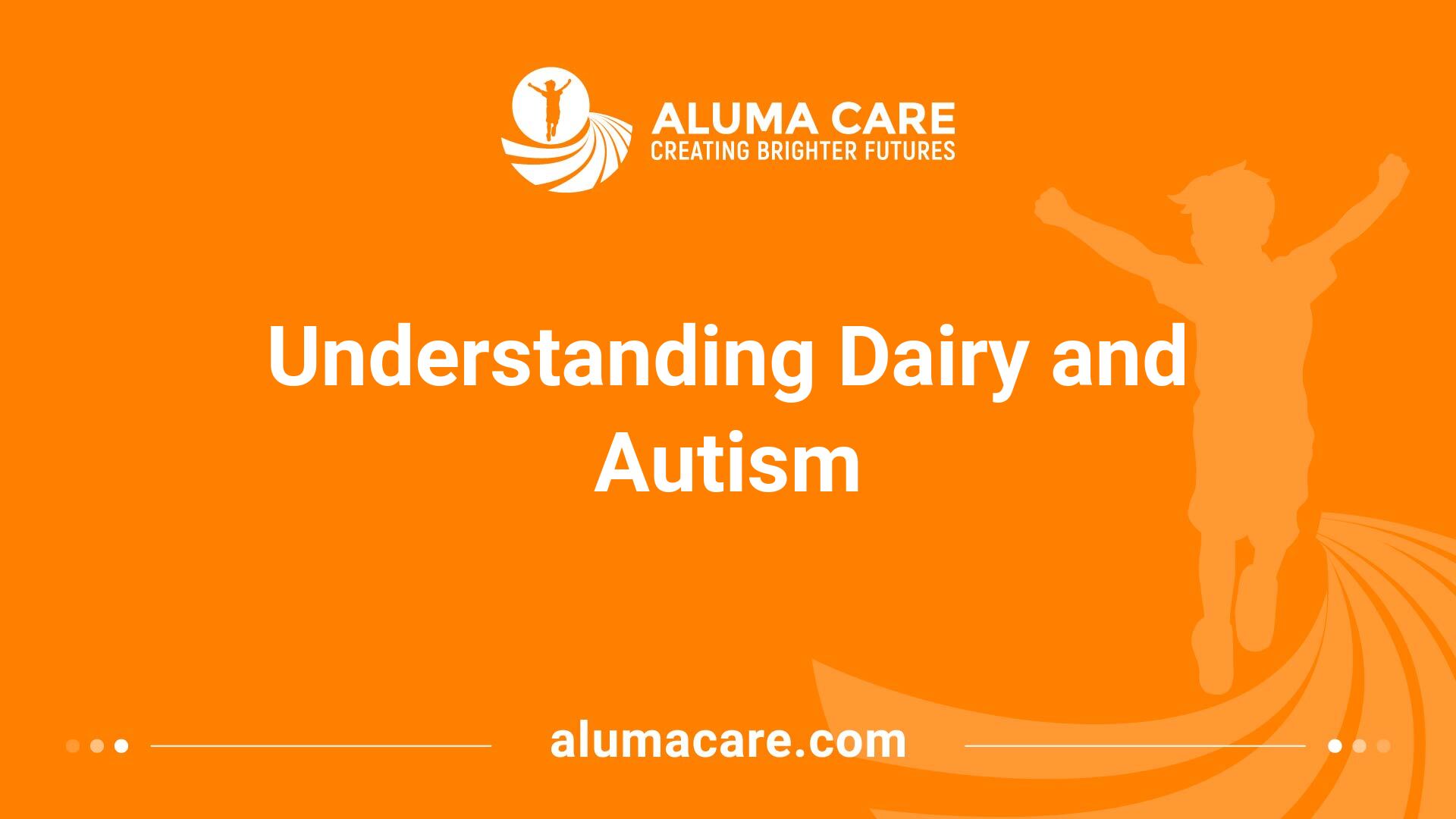Understanding Dairy and Autism

Exploring the Dairy-Autism Connection
The relationship between dairy consumption and autism has garnered attention in various discussions surrounding autism spectrum disorder (ASD). Some parents report observing improvements in their child's autism symptoms after eliminating dairy products from their diets, indicating potential impacts of dairy on autism. Research has also pointed to a possible link; for instance, a study found that children with autism exhibited higher levels of beta-casomorphin-7 (BCM-7), a peptide that results from the breakdown of casein, a protein in milk. This indicates a potential connection between dairy consumption and autism symptoms [1].
Additionally, maternal dairy intake during pregnancy has been analyzed for its correlation with autism risk. Increased consumption of dairy products by mothers has been associated with a heightened risk of having a child with autism, which raises questions about the dietary practices during pregnancy and their impact on child development [1].
Research FocusFindingsChild's Dairy ConsumptionHigher levels of BCM-7 in urine associated with autismMaternal Intake During PregnancyIncreased risk of autism with high dairy consumption
Impact of Dairy Consumption on Autism
The impact of dairy on individuals with autism varies, with some showing sensitivity to casein, leading to potential negative effects on their well-being. It’s important to note that not everyone with autism will experience adverse symptoms from dairy consumption [2]. This sensitivity may contribute to behavioral changes or gastrointestinal issues, prompting some families to consider dietary adjustments.
Transitioning to a dairy-free diet can be beneficial for some, but it should be approached with care, especially for individuals who heavily rely on dairy in their diets. Abruptly cutting out dairy is not advisable; gradual changes should be implemented under the guidance of a dietitian or feeding therapist to ensure nutritional adequacy and ease the transition for those affected [2].
By understanding the connection between dairy consumption and autism, families can make informed decisions about dietary choices that may impact the health and behavior of individuals with autism. Further exploration into the specific mechanisms at play is necessary to fully understand how dairy may influence autism symptoms and overall well-being.
Associations with Autism Symptoms

An exploration of the connection between dairy and autism reveals a complex landscape, where anecdotal reports and maternal consumption may influence autism symptoms.
Anecdotal Reports and Dairy Elimination
Many parents have shared their experiences regarding changes in their child's autism symptoms after eliminating dairy from their diet. These changes hint at a potential impact of dairy consumption on autism Yellow Bus ABA Center. While these anecdotal reports suggest that some children may experience improvements in behavior or sensory processing, it is crucial to recognize that each individual with autism is unique.
Table 1 below summarizes common reported changes observed in children after dairy elimination.
Reported ChangeDescriptionDecreased AggressionSome parents note a reduction in aggressive behaviors post-elimination.Improved FocusA few have stated that their children demonstrate increased attention spans.Reduced Gastrointestinal IssuesParents have indicated fewer stomach-related concerns following dietary changes.
Despite these reports, it is important to emphasize that these observations are not scientifically conclusive. The belief that dairy may influence autism symptoms is fueled, in part, by the breakdown of specific proteins found in milk, such as casein and gluten, which may produce peptides with opioid-like effects. However, this theory remains speculative and requires more comprehensive research to validate or disprove it CrossRiverTherapy.
Maternal Dairy Intake and Autism Risk
Research indicates a potential correlation between higher maternal intake of dairy products during pregnancy and an increased risk of having a child with autism Yellow Bus ABA Center. This association raises questions about the role of nutrition during pregnancy and its potential effects on fetal development.
Maternal Dairy IntakeAutism RiskLowLower incidenceModeratePossible correlationHighIncreased risk
While the connection is noteworthy, it is essential to recognize that autism's etiology is multifactorial. Various environmental, genetic, and nutritional factors may contribute to the development of autism spectrum disorder. Mothers who are concerned about their dietary habits and potential impacts on their children are encouraged to consult with healthcare professionals specializing in nutrition and autism for tailored advice.
Understanding the associations between dairy consumption and autism symptoms remains an ongoing area of interest, prompting further inquiry into dietary influences during both pregnancy and childhood. For those interested in broader topics related to autism, consider exploring what is the autism spectrum disorder? and breastfeeding and autism for additional insights.
Biological Factors

The relationship between dairy consumption and autism involves several biological factors that are crucial for understanding the potential impact of dairy on individuals with Autism Spectrum Disorder (ASD). This section explores two significant aspects: beta-casomorphin-7 levels in autism and the proteins in milk and their relationship to inflammation.
Beta-casomorphin-7 Levels in Autism
Beta-casomorphin-7 (BCM-7) is a peptide that results from the breakdown of casein, a protein found in dairy products. Research has demonstrated that children with autism often have higher levels of BCM-7 in their urine compared to their non-autistic peers. This finding suggests a potential connection between dairy intake and the manifestation of autism symptoms.
Higher levels of BCM-7 may contribute to various neurological responses that could influence behavior and development in children diagnosed with autism.
GroupAverage BCM-7 Level (ng/ml)Children with Autism15-25Non-Autistic Children5-10
Proteins in Milk and Inflammation
In addition to BCM-7, specific proteins present in milk, such as casein and beta-lactoglobulin, have been shown to be elevated in the blood and urine of children with ASD. These elevated protein levels can lead to inflammatory responses in the body, which may affect brain function [3].
One study indicated that children with autism had significantly higher levels of antibodies to casein, suggesting that an immune response to dairy proteins might play a role in the development of autism. This potential interaction could indicate a biological predisposition that some individuals may have concerning dairy proteins.
Protein TypePotential ImpactCaseinLinked to immune responses, potential inflammationBeta-lactoglobulinMay exacerbate gut issues or inflammation
Understanding these biological factors is essential for exploring dietary interventions and their possible effects on autism symptoms. For those interested in alternative dietary approaches, investigating dietary interventions may provide useful options.
Dietary Interventions

Dietary interventions have gained attention in the discussion surrounding autism, particularly concerning the potential effects of certain food components, including dairy. This section explores strategies like the gluten-free and casein-free diets, the role of probiotics in gut health, and guidance on transitioning to a dairy-free diet.
Gluten-free, Casein-free Diet
Implementing a gluten-free and casein-free diet is one of the most recognized dietary interventions for individuals with autism. Some parents have noted positive changes in their child's autism symptoms upon eliminating dairy products, presenting anecdotal evidence regarding the connection between dairy consumption and autism. According to reports, the gluten-free diet excludes all sources of gluten found in wheat, barley, and rye. Many caregivers claim to see improvements in both behavior and physiological symptoms after following a gluten-free plan, although scientific studies show mixed results.
Dietary ComponentDescriptionGluten-freeEliminates gluten from dietCasein-freeExcludes casein, a milk protein
For further details regarding dietary limitations and autism, consult the article on can autism be cured?.
Probiotics and Gut Health
Research has indicated that probiotics may influence autism symptoms, particularly by enhancing gastrointestinal issues and social communication skills in affected children. Even though the mechanisms of action remain unclear, the potential link between gut health and autism symptoms has prompted further investigation. Therapeutic approaches targeting the gut microbiota of individuals with autism spectrum disorder (ASD) include probiotics, dietary supplements, and fecal microbiota transplantations (FMT). Early findings suggest these microbe-focused therapies might help alleviate certain ASD-related symptoms, but comprehensive studies with larger populations are needed to support these claims.
Type of TherapyPotential BenefitsProbioticsEnhanced gut health and improved social skillsFMT (Fecal Microbiota Transplant)Potential symptom reduction
For a deeper exploration of dietary elements impacting autism, visit breastfeeding and autism for information on the early dietary influences on autism development.
Transitioning to a Dairy-free Diet
Transitioning to a dairy-free diet should be handled with careful consideration, especially for individuals with autism who may rely heavily on dairy products. A gradual approach is recommended, rather than abrupt removal, which could lead to nutritional imbalances. It's advisable for these changes to be overseen by a dietitian or qualified feeding therapist to ensure nutritional adequacy during the transition. Similar to the gluten-free approach, the essence of the casein-free diet is to remove all sources of casein, which might play a role in influencing brain function and associated behaviors in individuals with autism.
Transition StrategyConsiderationsGradual ChangesEssential for a smoother transitionProfessional GuidanceRecommended to ensure nutrition balance
For guidelines and support regarding dietary adaptations related to autism, see our resource on accommodations for students with autism.
Research and Controversies

Conflicting Study Findings
The relationship between dairy consumption and autism remains a contentious topic. Currently, there is no concrete evidence establishing a direct link between dairy products and autism. While anecdotal reports suggest that some individuals have experienced changes in autistic symptoms after eliminating dairy from their diets, these accounts lack scientific validation.
Numerous studies have investigated the potential connection between milk consumption and autism. However, the results have been inconclusive. The scientific community emphasizes a cautious approach to this topic, underlining the importance of relying on evidence-based information [5].
StudyFindingsStudy 1No significant link between dairy intake and autism symptomsStudy 2Anecdotal evidence of symptom improvement upon dairy removal, but no scientific backingStudy 3Suggested digestive issues related to dairy could impact autism symptoms, but no conclusive evidence
Dairy Sensitivity in Autism
Some children with autism may exhibit a higher sensitivity to dairy products, revealing gastrointestinal disturbances and other symptoms upon consumption. While this phenomenon could suggest a connection, it does not establish a causal link between dairy intake and autism itself.
One proposed explanation for the connection involves the breakdown of specific proteins found in milk, such as casein. When digested, these proteins can produce peptides with opioid-like properties, possibly affecting brain function and contributing to autism symptoms. Nonetheless, this theory is largely speculative and requires further investigation to ascertain its validity [4].
As research continues, it's essential for individuals and families to consult healthcare professionals when considering dietary changes related to autism. For more insights on autism, consider exploring topics such as what is the autism spectrum disorder? and the implications of breastfeeding and autism.
Gut Health and Autism

The relationship between gut health and autism has become a focal point in research. Understanding the gut microbiome's role and exploring potential therapeutic interventions can provide insights into managing autism symptoms.
Gut Microbiome and Autism
Research indicates a direct link between gut microbial dysbiosis and epigenetic modifications in individuals with autism. Gut microbes produce essential nutrients necessary for methylation processes, including folate, vitamin B12, and choline. These nutrients contribute to the production of methyl donors that are crucial for DNA methylation, a key epigenetic regulatory mechanism [7].
Several studies have reported gastrointestinal issues, food sensitivities, and nutritional deficiencies among individuals on the autism spectrum. This connection highlights the importance of dietary choices in managing symptoms and improving overall health. Addressing gut health can play a significant role in the well-being of individuals with autism.
ComponentFunctionGut MicrobesSynthesize vital nutrients for methylationFolateContributes to DNA methylation processesVitamin B12Essential for proper neurological functionCholineAids in neurotransmitter synthesis
Therapeutic Interventions for Gut Health
A variety of therapeutic interventions focusing on gut health show promise for individuals with autism spectrum disorder (ASD). These interventions include:
These microbiota-targeted therapies have shown potential in reducing ASD-related symptoms, although further research with larger sample sizes is essential to validate their efficacy [7].
Dietary interventions, such as gluten-free and casein-free diets, aim to alleviate gastrointestinal issues and improve overall health in individuals with ASD. This approach addresses sensitivities that some individuals may have to specific food proteins, potentially improving behavioral and cognitive symptoms. Explore more about various dietary options by reviewing our article on dietary interventions for autism.
Understanding the connection between gut health and autism can empower caregivers and healthcare providers to implement more effective management strategies aimed at enhancing the quality of life for individuals with autism.








.svg)

.svg)
.svg)